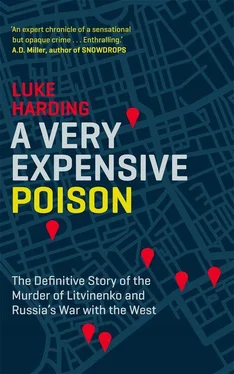The ostensible purpose of Kovtun’s trip to Hamburg at the end of October 2006 was to tidy up his affairs. Every six months he flew to Germany to get a stamp. Wall had made him an appointment at the city council’s aliens’ department in Hamburg’s Platz der Republik. This was a large rectangular neo-classical building, not far from where Il Porto used to be, with an equine statue of the German emperor William I in front of the entrance. Here Kovtun would get a German resident’s permit inserted into his new Russian Federation passport.
The real purpose of the trip was different. From Hamburg, Kovtun intended to travel back to London again, a city he had visited for the first time two weeks previously. There he had a job to finish: to poison Alexander Litvinenko. It sounded easy. But Kovtun and Lugovoi’s previous attempt of 16 October in the offices of Erinys hadn’t worked and Lugovoi’s second effort, on 26 October, had misfired too, with the polonium ending up on a bathroom hand towel. Litvinenko was still alive.
Kovtun flew into Hamburg at midday on 28 October 2006, on an Aeroflot flight from Moscow. Marina, her new partner and children met Kovtun at the airport. They drove him in her BMW to their home at Erzbergerstrasse 4 in the centre of town. Wall’s flat was in a late-nineteenth-century building belonging to her mother and her partner; sepia paintings of Hamburg-Altona’s old town hall and St Michael’s Church decorated the entrance lobby. Most of Wall’s neighbours in the five-storey property were students. The area, Ottensen, is central and congenial, with an S-bahn station nearby, as well as cafés and shops.
Kovtun said he was going to London to watch a football match. Since he didn’t have a credit card, Wall’s partner booked him a plane ticket on the internet. Kovtun gave him €70 in cash.
Subsequently, Kovtun’s movements in Germany were easy to reconstruct. As in London, the police found a trail. He had brought with him from Moscow radioactive polonium-210, the unique substance with which he intended to kill Litvinenko.
Like Lugovoi before him, Kovtun, seemingly, knew little or nothing about its properties. For example, that it left a ghostly signature wherever he went. Kovtun was, it seems, the classic dupe, tricked by whoever gave him the poison in Moscow. And – though it didn’t turn out that way – expendable.
From the moment he arrived, Kovtun contaminated everything he came into contact with. German detectives found polonium in Wall’s car, on the front passenger seat where he’d sat. And at her home. Radioactive traces were discovered in the living room and bedroom where he’d spent the night in Erzbergerstrasse. Traces too in a cupboard, on pillows – even on a teddy bear and a child’s jacket hanging on the coat rack.
Kovtun moved; so did the trail; it followed him like a spectre. The next day, 29 October, Wall’s mother Eleanora drove Kovtun to her house in Haselau, where Kovtun stayed the night. They spent a jolly evening. In the kitchen Kovtun unpacked gifts from Moscow – a bottle of vodka, chocolate-coated marshmallows and two glass jars containing pickled mushrooms, a present from Kovtun’s mother. Kovtun was wearing his black polo-neck pullover and dark-blue jeans. ‘He’s a very soft person. He isn’t a businessman, he’s a philosopher,’ Eleanora told German police.
Despite her fond view of Kovtun, polonium was found in Eleanora’s house too. The following morning, 30 October, Kovtun visited the aliens’ department. One faint trace of radiation was discovered – under Kovtun’s new passport photo.
The trail of polonium was itself remarkable, but the German police discovered other significant evidence as well. They found witnesses, including one to whom Kovtun confided about his real motive for going to London.
Usually, when he visited Hamburg, Kovtun would meet with D3, his restaurant manager friend from Il Porto. On 30 October, Kovtun called D3, told him he was in town and said he would like to see him. This was normal: generally Kovtun would make contact out of the blue.
At about 7 p.m., D3 was having dinner with another friend from his Il Porto days, codenamed D5. The pair were eating in the Tarantella restaurant, a newly opened bistro in the city centre next to Stephansplatz. Kovtun arrived by S-bahn and phoned to say he didn’t know where to go. D3 found him on the opposite side of the street. He invited him to join them. As usual, Kovtun was broke. Kovtun said he didn’t want to eat. According to D3, he and D5 ended up sharing some of their meal with Kovtun. Kovtun asked his former colleagues to order some red wine for him, which they did, a quarter of a litre.
So far, so unremarkable. All three left the restaurant, with D5 strolling on ahead to buy cigarettes. Their destination was a slot machine arcade in Steindamm, twenty minutes away on foot. At the time Steindamm was a sort of mini-Reeperbahn, a sleazy area of Hamburg known for its drugs, porn shops and street walkers.
As they walked along, Kovtun revealed something extraordinary. ‘It happened when Dmitry and I were now alone and he told me this tale,’ D3 said. Kovtun had mentioned he was flying to London on business. Now, he said, he was actually going there to commit a murder. What’s more, he needed D3’s help.
The conversation, recounted by D3 to German police, went like this:
KOVTUN: Do you know someone called Litvinenko? Have you heard of him?
D3: No.
KOVTUN: Litvinenko is a traitor! There is blood on his hands! He does deals with Chechnya!
The conversation was a weird one. D3 hadn’t the faintest clue who Litvinenko was; why should he? Nor did he know anything of Litvinenko’s alleged treachery.
The conversation got weirder.
KOVTUN: Do you know a cook who is working in London?
D3: Yeah, that guy who was with us at Il Porto.
Though he had lost touch with him, D3 mentioned a young Albanian chef who’d been their colleague back in the nineties and early noughties. Since then he’d moved to the UK. D3 didn’t know details. Then:
KOVTUN: I have a very expensive poison. I need this cook so he can put the poison in Litvinenko’s food or drink.
D3: You’re crazy! The cook is married, has kids. [Jokingly] Wouldn’t it be much easier to shoot this Litvinenko instead?
KOVTUN: It’s meant to set an example. Litvinenko is well protected in London. I intend to lure him out with an interview. And then to poison him.
D3: Look, stop all this nonsense. Why don’t you get a proper job? Why are you telling me, of all people, this crap?
KOVTUN: You mustn’t tell anybody.
D3: Who the hell am I supposed to tell?
KOVTUN: I’ll soon have my own flat in Moscow.
D3: [Conciliatory] That’s nice. I could come and visit you there.
Asked by police if Kovtun had put a figure on the cost of the poison, D3 said he couldn’t remember. He said: ‘Dmitry mentioned a sum which was incredibly high.’ It was clear that Kovtun’s own reward for his role in the operation was real estate in the Russian capital. Who would be paying for it wasn’t clear.
At the time, D3 thought that Kovtun’s fantastical tale was ‘rubbish’, the ramblings of a man who had watched too many TV spy dramas. The story sounded crazy, nuts. It confirmed his belief that Kovtun was a dreamer. Did he ask how Kovtun obtained such an expensive poison? ‘No. I didn’t believe him and therefore I didn’t ask,’ D3 replied to police.
The story seemed even less plausible because during the same conversation Kovtun mentioned his latest money-making idea. Even by Kovtun’s dismal standards, it was a daft one. Kovtun said that he and his ex-wife might pose naked in Praline , a popular soft-porn magazine. Praline was sold at every station kiosk. They would make ‘loads of money’, he told D3.
Читать дальше












